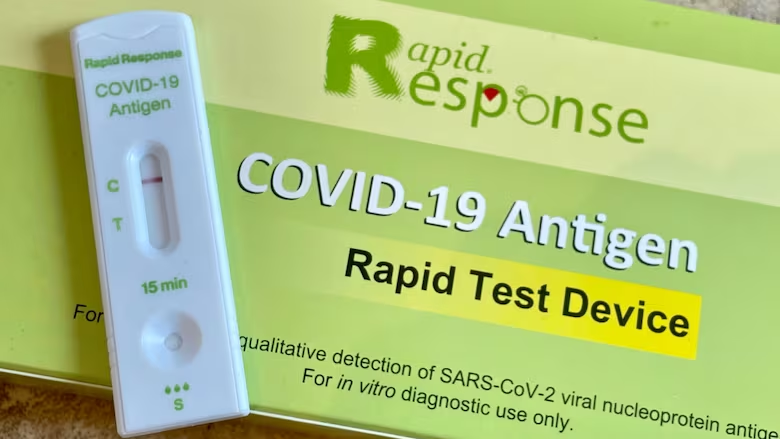The slow road to rapid antigen tests: Why Manitoba waited to use a pandemic-fighting tool
Officials spent months dismissing the utility of rapid tests to detect COVID-19

Nearly two years into the pandemic, Manitoba has become a late convert to the notion rapid antigen tests could serve as one weapon in its pandemic-fighting arsenal.
All it took was the emergence of the highly contagious Omicron variant, unprecedented demands for tests from symptomatic Manitobans and a resulting testing backlog that surpassed 10,000 nasopharyngeal samples on Christmas Eve.
The polymerase chain reaction tests conducted in laboratories, better known as PCR tests, remain the gold standard means of detecting the presence of COVID-19.
Rapid antigen tests are less sensitive but most epidemiologists consider them valuable as a second line of defence.
Precisely because of that lower sensitivity, a positive reading on a rapid test almost certainly means whoever provided that sample actually has COVID-19.
That means testing kits that can be used effectively at home by people with COVID symptoms when it's impractical, impossible or even just inconvenient to venture out to one of those overburdened COVID-19 testing centres where samples are gathered for PCR tests.
Public health officials, however, appear to be spooked by the corollary aspect of rapid antigen testing: A negative test result after the use of one of these take-home kits may not mean very much of anything.
People familiar with pandemic policy say officials in many provinces feared the use of rapid tests would provide people with a false sense of security and lead them to ignore pandemic restrictions.
This appears to be the case in Manitoba, where elected officials and public health officers alike have been dismissive or worse about the utility of rapid tests.
When former premier Brian Pallister was asked why Manitoba made so little use of Abbott rapid antigen tests purchased by the federal government, he famously compared the devices to one of the world's worst cars.
"They've got some value. So did the Ford Pinto, but it didn't mean everybody bought it," Pallister said in February.

Flash forward 11 months to the lead-up to this holiday season, and deputy provincial public health officer Dr. Jazz Atwal said the devices were not very useful to detect COVID among asymptomatic patients — something few proponents of rapid tests were advocating.
Then last week, Chief Provincial Public Health Officer Dr. Brent Roussin said rapid antigen tests could not be deployed because they come in large packages.
"The kits that we have can't really be broken down further than 25 tests, so those are less easy to just distribute through the community," Roussin said on Friday.
Days later, staff at a Winnipeg grocery store subdivided packages of 25 rapid antigen tests and sold them individually by photocopying the instructions, sanitizing the product and placing both in individual plastic bags.
The kits sold out at Food Fare in three days.
This is not to suggest grocers understand public health better than medical professionals. Grocers simply have more experience when it comes to packaging.
The real issue appears to be a constant problem during the pandemic: An apparent desire on the part of public health authorities to control the message at all costs, even when it's obvious the target audience has lost faith in the messenger.
On Dec. 22, when motorists were lining up for hours in the hopes of getting someone to stick a long Q-Tip up their nostril, Dr. Atwal was still insisting Manitoba's testing capacity was not pushed to the limit.
On Dec. 23, the province announced through a press release the demand for PCR tests had surpassed the laboratory processing capacity by 7,500 tests.
On Dec. 24, when Health Minister Audrey Gordon was asked whether she regrets her government's slow embrace of rapid antigen testing, she responded by stating PCR tests had up until then met Manitobans' needs.
Members of the public who still pay attention to public health briefings may notice it is difficult to reconcile these three statements.

To be fair to the elected officials, it wouldn't be easy to send rapid antigen tests into people's homes without the blessing of the public health officers who would have to communicate the best way to use these tests.
But at some point, someone had to act.
No one did before Omicron arrived in Manitoba, infected thousands of people and utterly overwhelmed the laboratory processing capacity.
University of Manitoba epidemiologist Souradet Shaw called this puzzling.
"There are some legitimate concerns about the use and role of rapid antigen tests, just as there are with any screening test, but it would have gone a long way if Manitoba had tried to normalize the use of these tests as they became available from the federal government earlier this year," he said on Tuesday.
"Instead, we are caught in a mad scramble to try and roll out a program in the midst of the largest number of cases we have ever seen, with likely the most transmissible variant yet observed, while our lab capacity has been overwhelmed.
"This is akin to building an airplane while you're flying it."
Right now, it's the testing labs that can't keep up. In a matter of days or weeks, it may be our intensive care wards.

